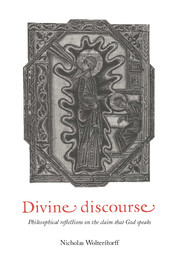Book contents
- Frontmatter
- Contents
- Preface
- 1 Locating our topic
- 2 Speaking is not revealing
- 3 The many modes of discourse
- 4 Divine discourse in the hands of theologians
- 5 What it is to speak
- 6 Could God have and acquire the rights and duties of a speaker?
- 7 Can God cause the events generative of discourse?
- 8 In defense of authorial-discourse interpretation: contra Ricoeur
- 9 In defense of authorial-discourse interpretation: contra Derrida
- 10 Performance interpretation
- 11 Interpreting the mediating human discourse: the first hermeneutic
- 12 Interpreting for the mediated divine discourse: the second hermeneutic
- 13 Has Scripture become a wax nose?
- 14 The illocutionary stance of biblical narrative
- 15 Are we entitled?
- 16 Historical and theological afterword
- Notes
- Index
4 - Divine discourse in the hands of theologians
Published online by Cambridge University Press: 01 June 2011
- Frontmatter
- Contents
- Preface
- 1 Locating our topic
- 2 Speaking is not revealing
- 3 The many modes of discourse
- 4 Divine discourse in the hands of theologians
- 5 What it is to speak
- 6 Could God have and acquire the rights and duties of a speaker?
- 7 Can God cause the events generative of discourse?
- 8 In defense of authorial-discourse interpretation: contra Ricoeur
- 9 In defense of authorial-discourse interpretation: contra Derrida
- 10 Performance interpretation
- 11 Interpreting the mediating human discourse: the first hermeneutic
- 12 Interpreting for the mediated divine discourse: the second hermeneutic
- 13 Has Scripture become a wax nose?
- 14 The illocutionary stance of biblical narrative
- 15 Are we entitled?
- 16 Historical and theological afterword
- Notes
- Index
Summary
With one eye constantly on the claim that God speaks, I reflected in my last chapter on the many modes of human discourse. My assumption was and is that if it is coherent to suppose that God speaks, then here and there among the many modes of human discourse will be some that can be used to illuminate how God speaks. We must now reflect on the nature of speech as such. But I propose postponing that topic for one chapter. We have looked at divine discourse from the perspective of the many modes of human discourse. Let us also look at it from the perspective of reflections by theologians on the modes and means of divine discourse. We must be selective though. Here is not the place to introduce a history of theological reflections on the Word of God. It was Karl Barth who, of all contemporary theologians, spoke most insistently and persistently, and I might add, provocatively, about God speaking. So let us look at the structure of Barth's thought. With one addendum. Let us preface our study of Barth with a glance at Paul Ricoeur's essay (to which I already referred in my preceding chapter), “Toward a Hermeneutic of the Idea of Revelation.”
Ricoeur's account of divine revelation
Ricoeur's account of divine speech and divine revelation is especially instructive for our purposes here because it situates a rather close look at the biblical text in the context of general reflections on the nature of language.
Information
- Type
- Chapter
- Information
- Divine DiscoursePhilosophical Reflections on the Claim that God Speaks, pp. 58 - 74Publisher: Cambridge University PressPrint publication year: 1995
